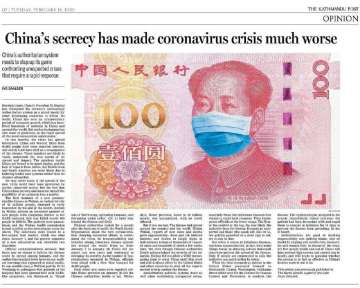After an op-ed on China’s handling of the coronavirus epidemic, published on Feb 18 in Nepal’s leading English daily Kathmandu Post, triggered an angry reaction from Beijing, the editor-in-chief of the newspaper Anup Kaphle stepped down on Thursday. Kaphle has been replaced by Sanjeev Satgainya, the Kantipur Media Group Chairman and Managing Director Kailash Sirohiya announced on Thursday.
The resignation of Kaphle from the position follows the publishing of an op-ed in the English daily, titled China’s secrecy has made coronavirus crisis much worse. The picture accompanying the piece, that of the Communist Party of China patriarch Mao Zedong with surgical mask, drew condemnation from the Chinese embassy in Nepal.
“It is regrettable that Mr. Anup Kaphle, Chief Editor of The Kathmandu Post has always been biased on China-related issues. This time he went as far as disregarding the facts and becoming a parrot of some anti-China forces and, therefore, his ulterior purpose is destined to failure. The Chinese Embassy in Nepal has made solemn representations to the newspaper and himself and reserves the right of further action,” said the embassy statement on Feb 18.
The op-ed in question, which also appeared in South Korean daily Korean Herald, raised doubts on Beijing’s claims about the extent of the spread of COVID-19, as the new strain of the coronavirus has been christened.
What did the article say?
From the word go, the op-ed remained critical of China’s President Xi Jinping, stating that Xi’s “authoritarianism has also come at great cost, as the rapid spread of the novel coronavirus underscores.”
“These numbers are likely to vastly understate the true extent of its spread and impact. The numbers inside China are bound to be much higher, and the lack of reports from Africa, the Middle East and South America are more likely due to faltering health care systems rather than its absence altogether,” the op-ed, as it appeared in Korea Herald, states.
“We may never know if the spread of the new virus could have been prevented by earlier, concerted action. But the fact that China chose secrecy and inaction turned the possibility of an epidemic into a reality,” it goes on.
The op-ed notes that between Jan 2 and Jan 18, China ‘downplayed’ the severity of the spread of the virus.
“Only when new cases were reported outside Hubei province on Jan. 20 did the Chinese authorities decide to act. Within days, Hubei province, home to 50 million people, was quarantined, with no travel allowed,” the op-ed alleges.
“But it was too late. The disease had spread around the country and the world. Within Wuhan, reports of new cases and deaths grew exponentially — from just 100 infected patients and deaths in single digits in mid-January, to tens of thousands of reported cases and hundreds of death a few weeks later,” the published piece, authored by Iva Daalder, went on to say.
The full op-ed in Korean Herald can be read here.
Latest World News

